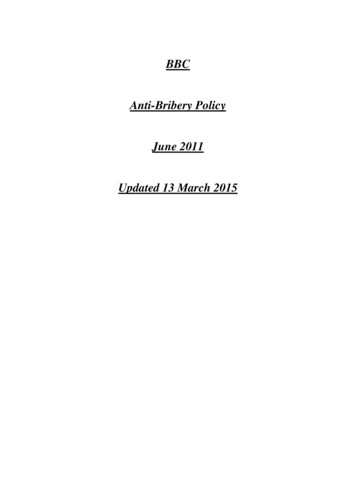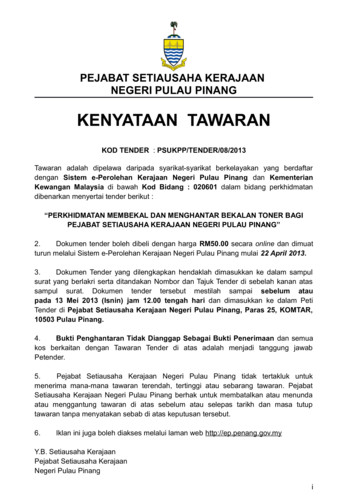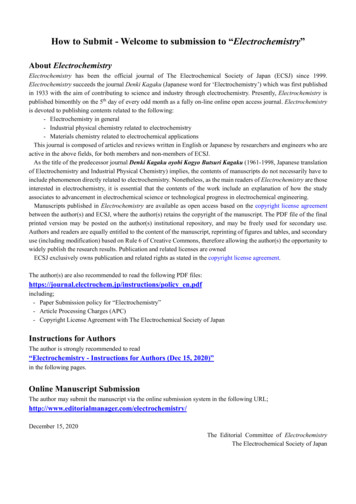Texas Core Curriculum Assessment Guid
Academic Quality and WorkforceGuide for theTexas Core Curriculum Assessmentand Assessment ReportJune 2017Updated December 2018
Guide for the Texas Core Curriculum Assessmentand Assessment ReportThe Texas Core Curriculum AssessmentThe Texas Core Curriculum (TCC) forms the foundation for the general education curriculumoffered by Texas public institutions of higher education (IHE). The TCC assessment reportprovides Texas IHE an opportunity to discover, document, and seek improvements to studentattainment in the six Core Objectives. The TCC assessment report also addresses formativestudent achievements for each of the six Core Objectives.Faculty participation is integral throughout the assessment process. For an effectiveassessment, IHE use multiple assessment measures, including at least one direct measure perCore Objective. Externally informed benchmarks are encouraged and appropriate sampling ofartifacts is required.IHE are required to submit a TCC assessment report every 10 years. Texas Higher EducationCoordinating Board (THECB) staff review TCC assessment reports and provide feedback. It is aninstitution’s responsibility to implement institutional changes based on the TCC assessment, ifneeded.IHE are encouraged to participate voluntarily in a peer review of the TCC assessment of the sixCore Objectives and incorporate feedback to the institution from the peer reviewers. Definitionsspecific to the TCC and TCC assessment are provided in the following section.DefinitionsThe definitions included in this section are specific to the TCC and TCC assessment report.Assessment cycle: The systematic collection, review, and use of evidence for the purpose ofimproving student learning throughout the core curriculum.Direct measure: Demonstration of student learning, performance, or achievement usingevidence such as course assignments, assessments, and performance evaluations.Indirect measure: Perception of student learning, performance, or achievement using selfreported data or measures not derived directly from student work.Benchmarks: Targets for student attainment established internally by the institution orexternally by advisory boards, peer institutions, national norms, or other entities, whereachievement can be evaluated using direct and/or indirect measures.Document Submission Portal: Login-required document submission system for the Divisionof Academic Quality and Workforce of the Texas Higher Education Coordinating Board.It is accessible at ne 2017; Updated December 2018
Report of the TCC Assessment to the THECBTexas public institutions of higher education (IHE) submit their TCC assessment report of theCore Objectives to the Coordinating Board every 10 years through the Texas Higher EducationCoordinating Board's (THECB) Document Submission Portal. The appropriate pull-down choicefor the TCC assessment report is "Core Curriculum Report."The TCC assessment report is due to the THECB at the same time (spring or fall semester) theinstitution's compliance certification report is due to Southern Association of Colleges andSchools Commission on Colleges (SACSCOC). The TCC assessment was established with theidea that institutions could use the assessment to satisfy SACSCOC Principles of Accreditation:Foundations for Quality Enhancement (effective January 1, 2018) Standard 8.2.b., in whole orpart. While the TCC assessment may be used to satisfy the SACSCOC Comprehensive Standard8.2.b., a positive THECB review of the TCC assessment report in no way guarantees a positiveSACSCOC review. Additionally, the TCC assessment report must be tailored to the TCCrequirements.The TCC assessment report includes the following components (Texas Administrative Code,Title 19, Chapter 4, Section 4.30):I.II.Assessment of the Core Objectivesa. Description of Assessment: for each of the six Core Objectives.b. Assessment Methods: explanations of measures, methodology, frequency andtimeline of assessment activities, including representative samplingmethodologies.c. Criteria/Targets: explanation of targets used to benchmark the attainment ofthe six Core Objectives.d. Results: evidence of level of attainment targeted and achieved for each of thesix Core Objectives.e. Analysis: analysis and interpretation of assessment information.f. Actions and Follow-ups: actions planned, based on assessment results, forthe improvement of student learning and achievement.Evaluation of the Assessment Processa. Description of the strengths and weaknesses of the assessment process.b. Possible actions planned to improve the assessment process.2June 2017; Updated December 2018
THECB ReviewReview of the TCC assessment report is qualitative. The review determines whether aninstitution's assessment of the Core Objectives was complete in addressing assessmentelements and whether the assessment process was suitable to deliver assessment results ofvalue. Based on this review, staff evaluate the success of the core curriculum assessment asfollows:1. Institution’s assessment of the Core Objectives is complete in addressing assessmentelements:a. THECB staff find that all components as required by Texas Administrative CodeTitle 19, Chapter 4, Section 4.30, are included in the assessment report.b. THECB staff find that the assessment report is missing components as requiredby Texas Administrative Code Title 19, Chapter 4, Section 4.30.2. Institution’s assessment process is suitable to deliver assessment results of value:a. THECB staff find that the institution’s assessment process is suitable to deliverassessment results of value.b. THECB staff find that the institution’s assessment process is not suitable todeliver assessment results of value.If the THECB review of the TCC assessment report finds that there are missing components(1.b) or that the assessment process is not suitable (2.b), the THECB staff response to theinstitution will include an explanation of the finding. In that case, the response may specifyappropriate follow-up information or reporting.3June 2017; Updated December 2018
Recommended TCC Assessment Report OutlineThe following report outline is recommended for the 10-year TCC assessment report. Thefollowing outline provides a suggested uniform sequence and a suggested scope of writtenreport material. Institutions may modify the outline elements to provide information specific totheir TCC assessment. A suggested length of the report, without appendices, is 40 or fewerpages.I.Title Pagea.b.c.d.II.InstitutionContact informationReport dateAssessment periodExecutive Summarya. Assessment summary for each of the six Core Objectivesb. Assessment summary of institution's assessment processIII.Assessment of Core Objectivesa. Description of Assessment Description of overall assessment process Description of assessment process for each Core Objective Key personnel and offices involved in the assessment processb. Assessment Methods Measures utilized to assess the Core Objectives Methods utilized to assess the Core Objectives Frequency of assessment cycle Timeline of assessment activitiesc. Criteria or Targets for Each Core Objective Number of criteria or targets per Core Objective Explanation of what is measured (e.g., artifacts of student work, surveys,observations) Description of measurement tools Level or score considered attainmentd. Results and Analysis Description of key personnel involved in the evaluation process Results of the assessments for each Core Objective Analysis and interpretation of results for each Core Objectivee. Actions and Follow-ups Dissemination process/plan of assessment results Planned actions to improve student learning, based on evidence Description of faculty and other stakeholder involvement in next steps Implementation of the action plan4June 2017; Updated December 2018
(Recommended TCC Assessment Report Outline continued)IV.Evaluation of the Assessment Processa. Description of strengths and weaknesses of the assessment processb. Plans for future assessment processesV.Summarya. Summative assessment of the institution's outcomes for Core Objectivesb. Summative evaluation of institution's assessment process and future plansVI.Appendices Detailed data tablesWeb links to supporting materialsOther supporting documentation5June 2017; Updated December 2018
FAQsIs THECB approval required prior to making changes to an institution’s assessmentplan? Institutions may modify, update, or change assessment strategies at any time. Pleasedocument and include information on the revisions in the TCC assessment report.Additional approvals or THECB notifications are not necessary at this time.What best practices should an institution use for their assessments? Institutions are encourage to identify assessment strategies that fit their institutionalneeds and resources. Assessment leaders are encouraged to utilize their peers andprofessional organizations to identify best practices for their institutions.What happens if an institution’s SACSCOC schedule changes? Institutions should notify the THECB that their SACSCOC reporting schedule haschanged. The TCC assessment report is due to the THECB at the same time (spring orfall semester) the institution's compliance certification report is due to SouthernAssociation of Colleges and Schools Commission on Colleges (SACSCOC).What happens after the TCC assessment report is submitted to the THECB? Staff review the submitted TCC assessment report and may provide feedback to theinstitution via phone call or letter.December 2018 updates SACSCOC citation updated, effective January 1, 2018.FAQ section added.6June 2017; Updated December 2018
This document is available on the Texas Higher Education Coordinating Board website:http://www.thecb.state.tx.usFor more information contact:Jennifer Nailos, Ed.D.Academic Quality and WorkforceTexas Higher Education Coordinating BoardP.O. Box 12788Austin, TX 78711PHONE (512) 427-6200FAX (512) 427-6168Jennifer.Nailos@thecb.state.tx.us
Recommended TCC Assessment Report Outline . The following report outline is recommended for the 10-year TCC assessment report. The following outline provides a suggested uniform sequence and a suggested scope of written report material. Institutions may modify the outline elements to provide information specific to their TCC assessment.
Handbook for Curriculum Assessment Curriculum Assessment: An Overview What is curriculum assessment? Curriculum assessment is a process of gathering and analyzing information from multiple sources in order to improve student learning in sustainable ways. Why bother assessing curriculum? Curriculum assessment can serve several major purposes:
3.0 TYPES OF CURRICULUM There are many types of curriculum design, but here we will discuss only the few. Types or patterns are being followed in educational institutions. 1. Subject Centred curriculum 2. Teacher centred curriculum 3. Learner centred curriculum 4. Activity/Experience curriculum 5. Integrated curriculum 6. Core curriculum 7.
Texas Math Course 1 (Grade 6) Texas Math Course 2 (Grade 7) Texas Math Course 3 (Grade 8) Texas Grade 6 iScience Texas Grade 7 iScience Texas Grade 8 iScience Texas Biology Texas Chemistry Texas Integrated Physics and Chemistry Texas Physics MHEtexas.com MK14M03416
Missouri City, Texas San Antonio City San Antonio, Texas San Antonio Surf Kyle, Texas SG1 Soccer Club Katy, Texas Sting Austin Austin, Texas Sting Corpus Corpus Christi, Texas Sting San Antonio San Antonio, Texas TEXAS Ajax SC New Braunfels, Texas Alamo City SC San Antonio, Texas Albion Hurr
TEXAS . Brown Mackie College Dallas/Fort Worth . TEXAS . Salon Boutique Academy . TEXAS . Cornerstone Christian Academy . TEXAS . ProFlight Aviation Services LLC . TEXAS . Central Texas Christian School . TEXAS . East Texas Christian School . TEXAS . JAMIE'S HOUSE CHARTER SCHOOL . TEXAS . Wharton County Junior College . Lee-Scott Academy .
Six-Core Core i7 16-Core SPARC T3 10-Core Xeon Westmere-EX 8-Core POWER7 Quad-core z196 Quad-core Itanium Tukwila 8-Core Xeon Nehalem-EX Six-Core Xeon 7400 Dual-Core Itanium 2 Itanium 2 with 9MB cache POWER6 Cell Itanium 2 Barton curve shows
assessment. In addition, several other educational assessment terms are defined: diagnostic assessment, curriculum-embedded assessment, universal screening assessment, and progress-monitoring assessment. I. FORMATIVE ASSESSMENT . The FAST SCASS definition of formative assessment developed in 2006 is “Formative assessment is a process used
countering bribery and corruption in all the jurisdictions in which we operate. In particular, we are committed to compliance with the Bribery Act 2010, in respect of our conduct both at home and abroad. The Bribery Act 2010 applies to individuals and all organisations carrying on a business in the UK, including the broadcasting sector. The territorial jurisdiction of the prosecutors extends .























